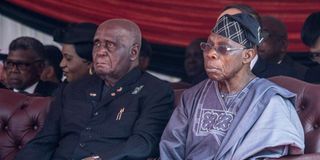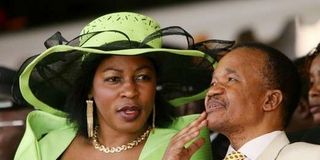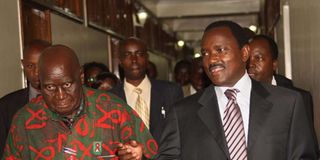Premium
Zambia's Kenneth Kaunda: A life of tribulations after 27 years in power

Former Zambian President Kenneth Kaunda and former Nigerian President Olusegun Obasanjo attend a farewell ceremony for late Zimbabwean President Robert Mugabe, held for family and heads of State, at the National Sports Stadium in Harare on September 14, 2019.
What you need to know:
- At the apex of political tension due to one-party State policies, increasing autocracy and the resultant economic downturn that led to a shortage of food and other essential products in the late 1989 to 1990, it was clear the Kaunda government was at the exit door.
Still waving his famous white handkerchief, Dr Kenneth Kaunda, Zambia’s founding President, is rarely seen in public due to old age.
Soon turning 97 years of age, Dr Kaunda’s voice is not as audible as it once was.
‘KK’, as he is fondly called, a vegan of many years, is one of the few remaining African liberation heroes, who has witnessed several leadership transitions.
He is still popular but not exactly in a political sense.
At the apex of political tension due to one-party State policies, increasing autocracy and the resultant economic downturn that led to a shortage of food and other essential products in the late 1989 to 1990, it was clear the Kaunda government was at the exit door. Those shortages of essential commodities bred food riots.
However, having been in power for about 27 years, it was unimaginable that Dr Kaunda would agree to leave office.
Still, the pressure mounts, with the labour movement, students, young and adults alike were fed up preparing to kick him out.
As that happened, a group of concerned and mostly educated Zambians gathered at Lusaka’s Garden House Motel on July 19-20, 1990 and formed the Movement for Multiparty Democracy (MMD).
The movement transformed into a political party after Dr Kaunda cut short his tenure, amended the Constitution to end one-party State politics and return to multiparty politics, and called for elections on October 31, 1991.
The MMD and Mr Frederick Chiluba emerged victorious, ending Dr Kaunda and his United National Independence Party’s 27 year-reign.

Zambia's second President Frederick Chiluba and his wife Regina are pictured as Rupiah Banda (not pictured) is sworn in as Zambia's fourth President in Lusaka on November 2, 2008.
Political trials post 1991
Soon after losing power, Dr Kaunda’s tribulations started piling on – the State denied him a retirement house, froze his salary and other entitlements and regularly curtailed his political freedoms.
In a self-titled biography, ‘Levy Patrick Mwanawasa – An incentive for Prosperity’, Zambia’s third President Mwanawasa recounts to his biographer Amos Malupenga as follows: “…I had to force him [Mr Chiluba] to give Kaunda his first salary [after leaving office]. I said [to Chiluba], ‘you will also be a former President at some point and you would want to be properly treated’. That is when he gave me a cheque to go and give Kaunda. Dr Kaunda got his first cheque as an entitlement shortly before I resigned as Vice President.”
Mr Mwanawasa went on, “…Soon after leaving State House, Dr Kenneth Kaunda was detained and searched on an allegation that he had stolen some books from State House… I advised that it was not necessary to resort to those levels … he was investigated … nothing came out of that investigation.”
But on his part, Mr Chiluba argued that he did not provide Dr Kaunda with his entitlements because the former President had returned to active politics against the provisions of the Constitution.
Attempt to run for presidency
Dr Kaunda attempted to once again run for the presidency in 1996, five years after leaving office, but his ambition was thwarted when the Chiluba government amended the Constitution, introducing stiffer conditions for one to qualify as a candidate.
Amendment Act No. 18 of 1996 of the Zambian Constitution, in Article 34(3)(b), states: “A person shall be qualified to be a candidate for election as President if … both his parents are Zambians by birth or descent…”
This provision was widely considered to have targeted Dr Kaunda, as it was common knowledge that he was born of parents who originally came from the neighbouring eastern country of Malawi .
They migrated to and settled in northern Zambia’s Chinsali District, where his father was a missionary.
Zambians and the international community widely condemned the Chiluba government for the repressive constitutional amendment.
But despite being technically stopped from running for the presidency and the withdrawal of his UNIP party from the elections, Dr Kaunda marshaled political support as leader of the former governing party.

A file photo of former Vice President Kalonzo Musyoka with former Zambian President Kenneth Kaunda, who paid him a caurtsey call at his Jogoo house office in Nairobi.
Gunshots at Kabwe
Alongside another opposition leader and lawyer, Dr Rodger Chongwe, the former President was shot in about August 1997, in the small mining town of Kabwe, about 140 kilometers north of the capital, Lusaka.
Dr Kaunda and Dr Chongwe claimed State police officers shot and wounded them after they addressed a political rally.
A few months later, another misfortune befell Dr Kaunda.
After the failed coup in October 1997, Dr Kaunda and many other opposition leaders were detained on suspicion that they were behind the army-staged coup attempt.
The statesman denied any link to the coup.
Heir apparent shot dead
In the bloody turn of events, Dr Kaunda’s son, the widely anticipated heir to the leadership of his father’s party and a potential President, was shot dead on November 4, 1999.
The Kaunda family, and Zambians in general, to date insist that the former army officer was killed in a political assassination.
Major Wezi Kaunda, once a member of Parliament in the home village of his mother, former first lady Betty Kaunda, in Malambo Constituency of the Eastern Province, was at the time of his assassination serving as chairman of UNIP in Lusaka.
The assassination was disguised as a carjacking.
Major Kaunda was with his wife in the vehicle when he arrived at his home in a Lusaka suburb, when the armed attackers approached.
She recounted that he told the killers, “I am Major Wezi Kaunda. Please take my car. Take whatever you want. I am not resisting. Spare my life and my wife. Just take the car.”
A gunman reportedly said, “We know who you are. Do you think we don't? Shoot him.”
The gang ordered him out of the vehicle and shot him multiple times. He was rushed to hospital but died a few hours later.
The mystery about Major Kaunda’s assassination remains unsolved.
His killing escalated the tension between Dr Kaunda and Mr Chiluba. Dr Kaunda subsequently quit active politics in 2000 and focused on peacemaking and mediation in Africa, as well as campaigns to combat HIV/Aids.





